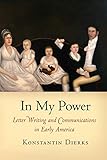In My Power : Letter Writing and Communications in Early America / Konstantin Dierks.
Material type: TextSeries: Early American StudiesPublisher: Philadelphia : University of Pennsylvania Press, [2011]Copyright date: ©2009Description: 1 online resource (376 p.) : 20 illusContent type:
TextSeries: Early American StudiesPublisher: Philadelphia : University of Pennsylvania Press, [2011]Copyright date: ©2009Description: 1 online resource (376 p.) : 20 illusContent type: - 9780812221817
- 9780812201758
- American letters -- 18th century -- History and criticism
- American letters -- History and criticism
- American letters -- 18th century -- History and criticism
- Letter writing -- United States -- History -- 18th century
- Letter writing -- United States -- History -- 18th century
- American Studies
- HISTORY / United States / Revolutionary Period (1775-1800)
- American History
- American Studies
- 816 .309 22
- PS416 .D54 2009eb
- online - DeGruyter
- Issued also in print.
| Item type | Current library | Call number | URL | Status | Notes | Barcode | |
|---|---|---|---|---|---|---|---|
 eBook
eBook
|
Biblioteca "Angelicum" Pont. Univ. S.Tommaso d'Aquino Nuvola online | online - DeGruyter (Browse shelf(Opens below)) | Online access | Not for loan (Accesso limitato) | Accesso per gli utenti autorizzati / Access for authorized users | (dgr)9780812201758 |
Browsing Biblioteca "Angelicum" Pont. Univ. S.Tommaso d'Aquino shelves, Shelving location: Nuvola online Close shelf browser (Hides shelf browser)

|

|

|

|

|

|

|
||
| online - DeGruyter An Imagined Geography : Sierra Leonean Muslims in America / | online - DeGruyter Florence and Its Church in the Age of Dante / | online - DeGruyter Fanny Kemble : A Performed Life / | online - DeGruyter In My Power : Letter Writing and Communications in Early America / | online - DeGruyter American Babel : Rogue Radio Broadcasters of the Jazz Age / | online - DeGruyter Marriage and Violence : The Early Modern Legacy / | online - DeGruyter The Burgundian Code : Book of Constitutions or Law of Gundobad; Additional Enactments / |
Frontmatter -- Contents -- Preface -- Introduction -- Chapter 1. Communications and Empire -- Chapter 2. Letter Writing and Commercial Revolution -- Chapter 3. Migration and Empire -- Chapter 4. Letter Writing and Consumer Revolution -- Chapter 5. Revolution and War -- Chapter 6. Universalism and the Epistolary Divide -- Conclusion -- Afterword: The Burden of Early American History -- Abbreviations and Archival Sources -- Index -- Acknowledgments
restricted access online access with authorization star
http://purl.org/coar/access_right/c_16ec
In My Power tells the story of letter writing and communications in the creation of the British Empire and the formation of the United States. In an era of bewildering geographical mobility, economic metamorphosis, and political upheaval, the proliferation of letter writing and the development of a communications infrastructure enabled middle-class Britons and Americans to rise to advantage in the British Atlantic world.Everyday letter writing demonstrated that the blessings of success in the early modern world could come less from the control of overt political power than from the cultivation of social skills that assured the middle class of their technical credentials, moral deserving, and social innocence. In writing letters, the middle class not only took effective action in a turbulent world but also defined what they believed themselves to be able to do in that world. Because this ideology of agency was extended to women and the youngest of children in the eighteenth century, it could be presented as universalized even as it was withheld from Native Americans and enslaved blacks.Whatever the explicit purposes behind letter writing may have been-educational improvement, family connection, business enterprise-the effect was to render the full terms of social division invisible both to those who accumulated power and to those who did not. The uncontested power that came from letter writing was, Konstantin Dierks provocatively argues, as important as racist violence to the rise of the white middle class in the British Atlantic world.
Issued also in print.
Mode of access: Internet via World Wide Web.
In English.
Description based on online resource; title from PDF title page (publisher's Web site, viewed 24. Apr 2022)


